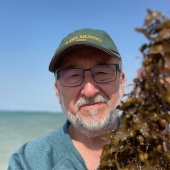
Prof. Alejandro H. Buschmann
Centro i-mar, CeBiB & Mash, Universidad de Los Lagos, Puerto Montt, Chile

Prof. Alejandro H. Buschmann
Centro i-mar, CeBiB & Mash, Universidad de Los Lagos, Puerto Montt, Chile
About the speaker:
Alejandro H. Buschmann is Full Professor at i-mar Research Center (www.i-mar.cl) at the Universidad de Los Lagos, obtaining its Ph.D. at the Pontificia Universidad Católica de Chile. At the present he is also a senior researcher at the Centre for Biotechnology and Bioengineering (www.cebib.cl) and the Marine Agronomy Center (https://mileniomash.cl). With over 150 peer-reviewed papers and book chapters, in aspects of coastal ecology, seaweed aquaculture, focusing on the role on integrated multi-trophic aquaculture (IMTA) towards a sustainable aquaculture development. Due to his scientific achievements, he was eligible as member of the Chilean Academy of Science. In the present he is part of editorial committees of scientific journals like Aquaculture, Aquaculture Environment Interactions, Reviews in Fisheries Science and Aquaculture, Perspective in Phycology, and Associate editor of the Journal of Phycology, Journal of applied Phycology and Algal Research. He was the Director of Research and Graduate School at the Universidad de Los Lagos and head of i-mar research Center. He has been designated in different scientific panels of the Chilean Science Agency as well as in national commissions for graduate program quality certification (CNA). As a scientific consultant, he has been able to support seaweed culture developments with the industry and the promotion of the use sustainable environmental technologies for aquaculture with different world stakeholders.
Company info:
The i-mar Research Center (https://i-mar.cl) is a research unit of the Universidad de Los Lagos based in the south of Chile. Research on coastal resources including seaweed and environmental sciences towards the conservation of the northern Patagonian coast are the main research topics.Presentation:
Seaweed production is undergoing a rapid global expansion at a time of accelerating climate change, hence raising new challenges for producers and the environment. Currently, a relevant proportion of seaweed production goes to human consumption and the polysaccharide industry, supporting the livelihood of millions of small-scale farmers and processors, including women. After 2010, a significant expansion of the global seaweed cultivation industry has been driven by the growing commercial demand for higher value seaweed-derived products, such as cosmetics, pharmaceuticals, including agarose used in clinical trials, biostimulants and biomaterials among other uses opening new market opportunities. On the other hand, seaweed production has several challenges related to their global expansion like the consolidation of new market opportunities, productivity sustainability, installation of proper and global biosecurity standards, and risk management such as diseases and grazing outbreaks, offshore cultivation conditions, eutrophication and climate change. In relation to these challenges, R&D&I and novel global and country level policies are required.